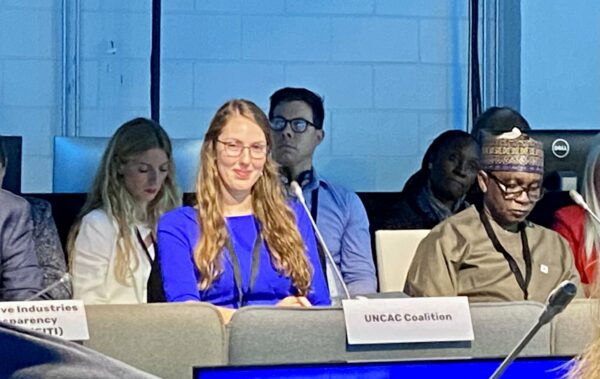14 September 2023 –
The UNCAC Coalition was delighted to participate for the first 
held in Tallinn, Estonia, on 6-7 September, with several partner events happening the same week. Besides attending and intervening at several interesting events on beneficial ownership transparency, civic space, kleptocracy, and other pressing anti-corruption topics, our Project Manager, Danella Newman, spoke on a High-Level Roundtable entitled “Catalyzing collective action globally, including through UNCAC, and ensuring that high-level global pledges lead to locally-led reforms.“
Besides recalling the importance of Article 13 of the UNCAC which highlights the crucial role of civil society in anti-corruption efforts, we called for States to sign our Transparency Pledge, committing to more transparency and participation in their UNCAC reviews, by publishing key documents and enabling the meaningful participation of civil society throughout the review process, as well as after it has been concluded. The UNCAC Coalition, together with the OGP will support the UK’s new Implementation Review Mechanism (IRM) Initiative which also aims for more transparency and participation. We highlighted the need to strengthen cooperation and coordination between OGP, UNCAC and other anti-corruption fora and their review mechanisms to maximize impact and help ensure that governments are meeting anti-corruption commitments. Finally, we stressed the importance of States raising their voices for civic space at international anti-corruption for a like the UNCAC Conference of the States Parties, the 10th session of which will take place in the USA at the end of this year.

Excellencies, distinguished colleagues. Thank you very much for the invitation for the UNCAC Coalition to speak at this event.
Article 13 of the UNCAC highlights the crucial role of civil society, calling for the participation of civil society in anti-corruption efforts and highlighting the importance of citizens’ access to information. The UNCAC Coalition aims to promote transparency and meaningful civil society participation in UNCAC implementation at the country, regional and global level.
One of the ways we are doing this is by advocating for States Parties to sign our UNCAC Review Transparency Pledge, which requires them to publish all key documents and information on the review, and to ensure that civil society can meaningfully participate throughout the review process. 35 States Parties have signed our Pledge so far, including some of the countries here, like the US, the UK, and others.
We are therefore delighted that one of our Pledge signatories, the UK, is launching its own IRM initiative as a way of promoting greater transparency and inclusiveness of the UNCAC IRM and fully support this initiative. Similarly, we are excited to work with the UK and OGP to increase the number of OGP countries that include civil society participation and transparency around UNCAC country reviews in their National Action Plans, which will improve outcomes in the fight against corruption. Including anti-corruption commitments from UNCAC and other fora in national action plans and outlining how that can be done in a transparent and inclusive manner will furthermore help achieve the OGP’s goals outlined in their new strategy.
We see a real need to strengthen cooperation and coordination between OGP, UNCAC and other anti-corruption fora and their review mechanisms to maximize impact and help ensure that governments are meeting anti-corruption commitments. They can work together to promote and scale up good practices to prevent and combat corruption and to ensure meaningful civil society participation in these efforts. The UNCAC is the most comprehensive, global, legally binding anti-corruption instrument, with 189 States parties to date. We urge OGP members, comprising 40% of UNCAC States Parties, to go beyond their national commitments and advocate for open and inclusive UNCAC fora. UNCAC Working group meetings, and in particular the UNCAC IRG, taking place this week again in Vienna, are closed to non-governmental stakeholders. Holding these meetings behind closed doors makes it extremely difficult for civil society to hold their governments accountable. Moreover, the UNCAC fora has been suffering from attempts to further limit its civic space, with States Parties blocking certain NGOs from participating in recent CoSPs. These objections are at most politically motivated, and are based on unfounded accusations. OGP members could play a vital role in overturning such objections, and pushing for a more inclusive and open UNCAC fora that will allow for meaningful and critical civil society participation.
Thank you for the opportunity to contribute to this discussion!




